Related Research Articles
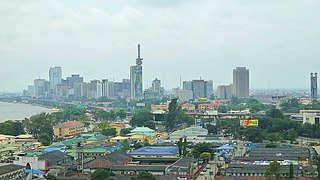
The economy of Nigeria is a middle-income, mixed economy and emerging market with expanding manufacturing, financial, service, communications, technology, and entertainment sectors. It is ranked as the 31st-largest economy in the world in terms of nominal GDP, the largest in Africa and the 27th-largest in terms of purchasing power parity.
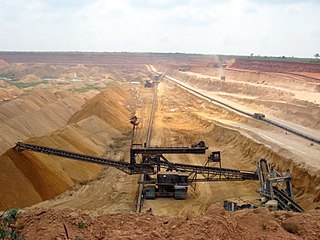
The economy of Togo has struggled greatly. The International Monetary Fund (IMF) ranks it as the tenth poorest country in the world, with development undercut by political instability, lowered commodity prices, and external debts. While industry and services play a role, the economy is dependent on subsistence agriculture, with industrialization and regional banking suffering major setbacks.
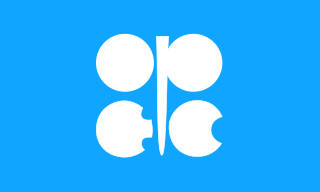
The Organization of the Petroleum Exporting Countries is an organization enabling the co-operation of leading oil-producing countries in order to collectively influence the global oil market and maximize profit. It was founded on 14 September 1960 in Baghdad by the first five members. The 13 member countries account for an estimated 30 percent of global oil production.
The Movement for the Survival of the Ogoni People (MOSOP), is a social movement organization representing the indigenous Ogoni people of Rivers State, Nigeria. The Ogoni contend that Shell Petroleum Development Company (SPDC), along with other petroleum multinationals and the Nigerian government, have destroyed their environment, polluted their rivers, and provided no benefits in return for enormous oil revenues extracted from their lands.
Sweet crude oil is a type of petroleum. The New York Mercantile Exchange designates petroleum with less than 0.5% sulfur as sweet.

Ẹ̀bà also known as Utara or Pinon is a staple swallow from Nigeria, also eaten in the West African sub-region and other African countries. The term èbà originates from the Yoruba people of southwest Nigeria. It is also called Utara by the Igbo People of Southeast Nigeria. It is a cooked starchy vegetable food made from dried grated cassava (manioc) flour commonly known as garri. It is often eaten with rich soups and stews, with beef, stockfish or mutton. The dish is often described as having a slightly sour, sharp taste.

Nigeria is the second largest oil and gas producer in Africa. Crude oil from the Niger Delta basin comes in two types: light, and comparatively heavy – the lighter has around 36 gravity while the heavier has 20–25 gravity. Both types are paraffinic and low in sulphur. Nigeria's economy and budget have been largely supported from income and revenues generated from the petroleum industry since 1960. Statistics as at February 2021 shows that the Nigerian oil sector contributes to about 9% of the entire GDP of the nation. Nigeria is the second largest oil and gas producer in Africa, a major exporter of crude oil and petroleum products to the United States of America. In 2010, Nigeria exported over one million barrels per day to the United States, representing 9% of the U.S. total crude oil and petroleum products imports and over 40% of Nigeria exports.

The Movement for the Emancipation of the Niger Delta (MEND) is a decentralised militant group in the Niger Delta region of Nigeria. MEND's actions – including sabotage, theft, property destruction, guerrilla warfare, and kidnapping – are part of the broader conflict in the Niger Delta and reduced Nigeria's oil production by 33% between 2006-07.
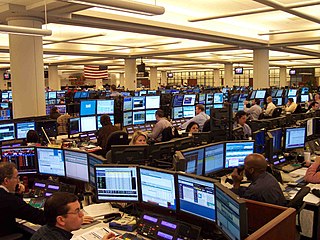
The price of oil, or the oil price, generally refers to the spot price of a barrel of benchmark crude oil—a reference price for buyers and sellers of crude oil such as West Texas Intermediate (WTI), Brent Crude, Dubai Crude, OPEC Reference Basket, Tapis crude, Bonny Light, Urals oil, Isthmus, and Western Canadian Select (WCS). Oil prices are determined by global supply and demand, rather than any country's domestic production level.

A benchmark crude or marker crude is a crude oil that serves as a reference price for buyers and sellers of crude oil. There are three primary benchmarks, West Texas Intermediate (WTI), Brent Blend, and Dubai Crude. Other well-known blends include the OPEC Reference Basket used by OPEC, Tapis Crude which is traded in Singapore, Western Canadian Select used in Canada, Bonny Light used in Nigeria, Urals oil used in Russia and Mexico's Isthmus. Energy Intelligence Group publishes a handbook which identified 195 major crude streams or blends in its 2011 edition.
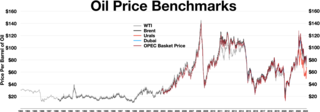
The OPEC Reference Basket (ORB), also referred to as the OPEC Basket, is a weighted average of prices for petroleum blends produced by OPEC members. It is used as an important benchmark for crude oil prices. OPEC has often attempted to keep the price of the OPEC Basket between upper and lower limits, by increasing and decreasing production. This makes the measure important for market analysts. The OPEC Basket, including a mix of light and heavy crude oil products, is heavier than both Brent crude oil, and West Texas Intermediate crude oil.

Sweet Crude is a documentary film about Nigeria's oil-rich Niger Delta directed by Sandy Cioffi. The film premiered in April 2009 at the Full Frame Documentary Film Festival and has since screened at 30 film festivals around the world and has won numerous awards.
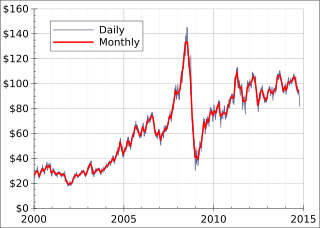
From the mid-1980s to September 2003, the inflation adjusted price of a barrel of crude oil on NYMEX was generally under $25/barrel. Then, during 2004, the price rose above $40, and then $60. A series of events led the price to exceed $60 by August 11, 2005, leading to a record-speed hike that reached $75 by the middle of 2006. Prices then dropped back to $60/barrel by the early part of 2007 before rising steeply again to $92/barrel by October 2007, and $99.29/barrel for December futures in New York on November 21, 2007. Throughout the first half of 2008, oil regularly reached record high prices. Prices on June 27, 2008, touched $141.71/barrel, for August delivery in the New York Mercantile Exchange, amid Libya's threat to cut output, and OPEC's president predicted prices may reach $170 by the Northern summer. The highest recorded price per barrel maximum of $147.02 was reached on July 11, 2008. After falling below $100 in the late summer of 2008, prices rose again in late September. On September 22, oil rose over $25 to $130 before settling again to $120.92, marking a record one-day gain of $16.37. Electronic crude oil trading was temporarily halted by NYMEX when the daily price rise limit of $10 was reached, but the limit was reset seconds later and trading resumed. By October 16, prices had fallen again to below $70, and on November 6 oil closed below $60. Then in 2009, prices went slightly higher, although not to the extent of the 2005–2007 crisis, exceeding $100 in 2011 and most of 2012. Since late 2013 the oil price has fallen below the $100 mark, plummeting below the $50 mark one year later.
On May 1, 2010, a ruptured ExxonMobil pipeline in the state of Akwa Ibom, Nigeria, spilled more than a million gallons into the delta and contributed to the major environmental issues in the Niger Delta. The spill had occurred at an Exxon platform some 20–25 miles (32–40 km) offshore which feeds the Qua Iboe oil export terminal. Exxon Mobil declared force majeure on Qua Iboe oil shipments due to the pipeline damage. The leakage in the Qua Iboe oil field discharged about 232 barrels of crude into the Atlantic Ocean contaminating the waters and coastal settlements in the predominantly fishing communities along Akwa Ibom and Cross River.
The Uganda–Kenya Crude Oil Pipeline (UKCOP) was a proposed pipeline to transport crude oil from Uganda's oil fields in the Northern and Western Regions to the Kenyan port of Lamu on the Indian Ocean. Along the way, the pipeline would have picked up more crude oil from the South Lokichar Basin and other oil fields in northwestern Kenya and delivered it to Lamu for export. South Sudan had also planned to construct a pipeline from its Unity State, linking to the UKCOP as an alternative to its only current oil export route through Port Sudan in its northern neighbor Sudan.
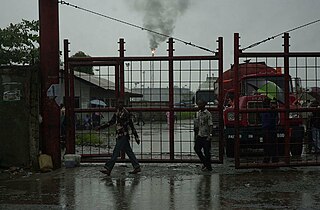
The Port Harcourt Refining Company,, is a Nigeria-based oil and gas company primarily specializing in the refining of crude oil into petroleum products. It is headquartered in Port Harcourt metropolitan area of Rivers State, southeastern Nigeria. The company is a subsidiary of the Nigerian National Petroleum Corporation (NNPC).
Nembe Creek Trunk Line (NCTL) is a 97 kilometre, 150,000 barrels of oil per day pipeline constructed by Royal Dutch Shell plc and situated in the Niger Delta region of Nigeria. "The Trunk Line is one of Nigeria's major oil transportation arteries that evacuate crude from the Niger Delta to the Atlantic coast for export." It is owned by Aiteo Group, which recently purchased it as part of the related facilities of the prolific oil bloc OML29 from Shell Petroleum Development Company, SPDC. By March 2015, the Shell Petroleum Development Company of Nigeria Limited (SPDC), a subsidiary of Royal Dutch Shell plc (Shell), completed the assignment of its interest in OML29 and the Nembe Creek Trunk Line to Aiteo Eastern E&P Company Limited, a subsidiary of Aiteo Group. The other joint venture partners, Total E&P Nigeria Limited and Nigerian Agip Oil Company Limited also assigned their interests of 10% and 5% respectively in the lease, ultimately giving Aiteo Eastern E&P Company Limited a 45% interest in OML29 and the Nembe Creek Trunk Line.
Oil theft in Nigeria is considered to be the illegal appropriation of crude or refined oil products from the pipelines of multinational oil companies. Oil theft in Nigeria is facilitated by the pragmatic co-operation between security forces, militia organizations, the local population, and oil company employees who use a variety of methods to steal oil from the multinational oil corporations that are stationed within the country. Currently, Exxon Mobil, Chevron, Equinor, Shell, and Agip are the five largest multinational oil companies present in Nigeria. Due to the lack of federal oversight and a large network of corruption, oil theft is primarily cellular rather than hierarchical and requires frequent collaboration between a variety of random players depending on the level of oil theft being committed. Each group maintains a specific role in the oil theft trade in Nigeria. These key players use methods such as hot-tapping and cold-tapping to perform oil bunkering and steal thousands of barrels of oil per day from established oil pipelines. In addition to stealing oil from the pipelines, oil theft can also occur during the transportation of the crude oil product to the oil shipping terminals for export.
As a practice of piracy, petro-piracy, also sometimes called oil piracy or petrol piracy, is defined as “illegal taking of oil after vessel hijacks, which are sometimes executed with the use of motorships” with huge potential financial rewards. Petro-piracy is mostly a practice that is connected to and originates from piracy in the Gulf of Guinea, but examples of petro-piracy outside of the Gulf of Guinea is not uncommon. At least since 2008, the Gulf of Guinea has been home to pirates practicing petro-piracy by targeting the region's extensive oil industry. Piracy in the Gulf of Guinea has risen in the last years to become the hot spot of piracy globally with 76 actual and attempted attacks, according to the International Maritime Bureau (IMB). Most of these attacks in the Gulf of Guinea take place in inland or territorial waters, but recently pirates have been proven to venture further out to sea, e.g. crew members were kidnapped from the tanker David B. 220 nautical miles outside of Benin. Pirates most often targets vessels carrying oil products and kidnappings of crew for ransom. IMB reports that countries in the Gulf of Guinea, Angola, Benin, Cameroon, Equatorial Guinea, Ghana, Guinea, Ivory Coast, Togo, Congo, and, especially, Nigeria, have experienced petro-piracy and kidnappings of crew as the most common trends of piracy attacks in the Gulf of Guinea.

Piracy network in Nigeria refers to the organisation of actors involved in the sophisticated, complex piracy activities: piracy kidnappings and petro-piracy. The most organised piracy activities in the Gulf of Guinea takes place in the Niger Delta region of Nigeria. A large number of both non-state and formal state actors are involved in a piracy operation, indicating a vast social network. As revealed by the arrested pirate Bless Nube “we do not work in isolation. We have a network of ministries’ workers. What they do is to give us information on the location and content of the vessels to be hijacked. After furnishing us with the information, they would make part payment, and after the hijack, they would pay us the balance.” Pirate groups draw on the pirate network to gain access to actors who provide security, economic resources, and support to pirate operations. This includes government officials, businesspeople, armed groups, and transnational mafia.
References
- ↑ Smith, Robert; Simon, Julia (30 October 2014). "How To Steal A Million Barrels Of Oil". Planet Money . NPR. Retrieved 1 November 2014.
- ↑ Mayah, Emmanuel (2 June 2014). "Where stolen Nigerian crude oil is sold". Probe. Wole Soyinka Centre for Investigative Journalism. Retrieved 1 November 2014.